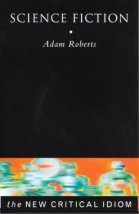
Science Fiction
Adam Roberts
204 pages, including notes and index
published in 2000
Adam Roberts is a relatively new UK science fiction writer, whose first novel, Salt was published in 2000 and nominated for a Clarke Award. Since then he has written several more. He comes from an unusual background for a science fiction writer, as he is a member of the English Department at the University of London. Which helps explain why he wrote this critical appraisal of science fiction at the same time as his first sf novel.
Simply but aptly titled Science Fiction, it is part of the New Critical Idiom series published by Routledge which, according to the introductory note in the front aims to provide "an invaluable series of introductory guides to today's critical terminology" and "an original and distinctive overview by a leading literary and cultural critic". In other words, this book is aimed at people in academia with no special knowledge of science fiction, who want to quickly gain at least a cursorily knowledge of the field.
If however, like me, you have some interest in science fiction in itself and its history, you'll find little new in here. Roberts starts with defining science fiction, then broadly outlines the history of the genre, from a discussion of its origins to the 1960ties and the New Wave. He then moves on to discussions of gender and race in science fiction and ends with the role of technology in science fiction and the way specific technologies are used as metaphors. At the end of each chapter, he examines a relevant science fiction work in some depth.
Even for a book intended as nothing but a general outline of science fiction rather than an in depth treatment of it, this is quite an ambitious program. Even more so because Roberts does not limit his treasise to the literary genre of science fiction, but also includes science fiction in the movies and on tv. Of the five sf works he explores in some detail, two are movies (Star Wars and Men in Black). On the whole however, he concentrates on written science fiction.
What Roberts does in Science fiction that makes it worth reading for those of us who are already acquainted with science fiction and its history, is the context in which he puts the familiar story. He argues for science fiction as a symbolist genre, "distinguished from other symbolist modes of literature by the fact that its symbols are deployed within a rationalised and materialist discourse, most usually that of 'science' and 'pseudo-science'. He further argues that "science fiction is about the encouter with difference", that this is what makes science fiction worthwhile, rather than any traditional literary values.
He has in my opinion only partially succeeded. Evaluating Science Fiction, it does do a decent job of introducing science fiction to an academic public. However, because of its ambitious scope and limited space, it does not do that well a job of arguing the definition of science fiction Roberts put forth, nor does it do justice to the complexity of science fiction. The trouble seems to be that Roberts tried to both write this introduction and put forth his own theory of science fiction at the same time. At times, these two different needs conflict, e.g. when he writes as if his own theories are accepted fact. This was especially noticable in the first two chapters.
On the whole, I found that when I stopped reading this as purely a factual account of science fiction but rather read this as an attempt by Roberts to explain his own views on science fiction, I was much happier in reading it. I also found I needed to adjust to the academic language Roberts used; if the extracts I've given above already make you break out in hives, you may have serious trouble reading this book. Finally, there were also some sloppy mistakes, e.g. referering to the editor of Astounding as Joseph Campbell in one instance, as well as some eyebrow raising statements, like "that it is probably fair to say that the present-day giants of the field are Ursula Le Guin and Octavia Butler" that took me some time to get over.
